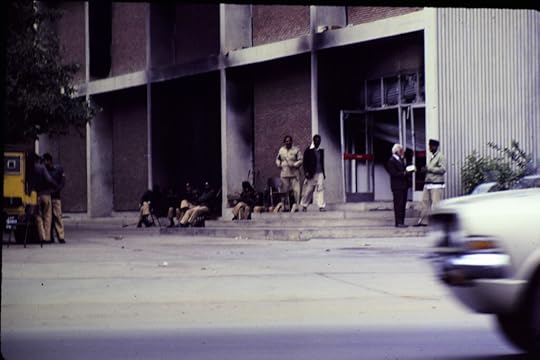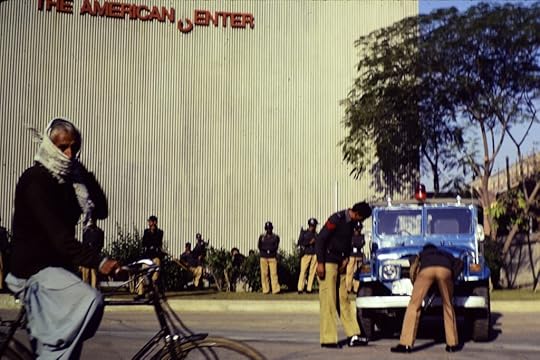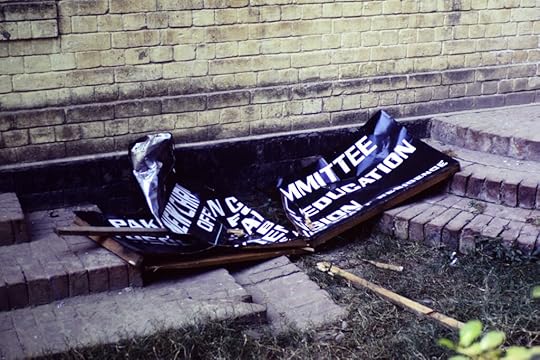How Chaos In Mecca Affected Life in Pakistan – Our Story continued, #32
In late November of 1979. I had just returned from teaching an extension class. The students were abuzz about the seizure of the holiest site in Islam, the Grand Mosque in Mecca.
It was a time of martial law in Pakistan. Discontent boiled beneath the surface. The economy was in a shambles. There was a renewed passion for Islamization, outrage at the continued existence of Israel, and an anger at all things western, especially American. At the same time demand for western consumer goods increased.
Mary Helen was in South Carolina attending her mother’s funeral. The kids were in Murree School. I kept my ears glued to BBC where I soon learned that the US embassy in Islamabad had been attacked and burned. American Centres in Rawalpindi and Lahore had been gutted. American Express and some other American offices had also been destroyed. The US began taking steps to fly out all non-essential consular personnel.

Burnt-out American Center in Lahore

Police guard burnt-out American Center in Lahore
At 7:00 pm, I was trying to relax over supper while Lal, our cook, stuffed home-made salami in the kitchen. Suddenly, we heard a chilling chant on the road outside. Allah-ho-akhbar, followed by shouts of Pakistan means, there is no God but Allah and Mohammed is his prophet.
I held my breath. The mob seemed headed toward the Christian Religious Centre, a part of the Forman Christian College campus. The Centre housed Intervarsity, our PACTEE office, and some staff housing. We soon heard shouts and sounds of things breaking.
We later learned that, after smashing our office sign, breaking windows and doors, and trashing some of our books, they gave all residents of the centre an ultimatum. Leave by 10:00 a.m. in the morning or be burnt out.
What had happened in Mecca that so aroused anti-western feeling? At 5 am on November 20th, 1979, the final day of the hajj, Sheikh Mohammed al-Subayil, imam of the Grand Mosque, was preparing to address 50,000 worshipers inside the mosque. Among the worshipers, what looked like mourners bearing coffins on their shoulders and wearing headbands made their way through the crowd. It wasn’t an unusual sight. Mourners often brought their dead for a blessing at the mosque. But they had no mourning in mind.[1]
The Sheikh was shoved aside by men who took machine guns from beneath their robes, fired them in the air and yelled to the crowd that, “The Mahdi has appeared!” Mahdi is the Arabic word for messiah. The “mourners” set their coffins down, opened them, and produced an arsenal of weaponry that they then brandished and fired at the crowd.
The attack was led by Juhayman al-Oteibi, a fundamentalist preacher and former member of the Saudi National Guard, and Mohammed Abdullah al-Qahtani, who claimed to be the Mahdi. They called for a revolt against the Saudi monarchy, accusing it of having betrayed Islamic principles and sold out to western countries. The 500 well-armed militants held this holy shrine for two weeks by retreating with hundreds of hostages to underground chambers.
It ended in a bloodbath. Prince Turki, youngest son of King Faisal, had summoned a French secret service officer who recommended that the hold-outs be gassed unconscious. Unfortunately, harsher minds prevailed and both militants and many hostages died. The incident and others around this time is thought to have spawned Al Qaida and similar militant Islamic groups.
But why did we have trouble in Pakistan? A false report that the United States was behind the mosque seizure aroused an angry mob. They were no doubt encouraged by agents from Iran. Ayatollah Khomeini had falsely blamed the seizure on the United States and Israel and later called the murders in Islamabad a “great joy.”
News filtered in about other incidents around the country. Three missionary couples with a sister mission 300 miles south were manhandled and their house wrecked. Two jeeps were burnt. The mob had tried to compel the senior man to recite the Muslim creed. Gradually trouble eased due to several wise bulletins from both Saudi Arabia and the Pakistani President.
Trouble, however, continued in the college community. Over the years, Forman Christian College in Lahore, one of the country’s premier educational institutions had graduated many of Pakistan’s leaders. Much of the property had already been nationalized, but not residences, the church, or the Christian Centre. The Christian principal had been deposed and a Muslim installed as acting principal. Although the school was still under a Christian board, it seemed unlikely that a Christian would ever again be allowed to serve. It soon became clear that a well-orchestrated plan had been worked out to use this pretext to occupy any property still in Christian hands.
The mob had first attacked the home of the Presbyterian missionaries who were property managers. They had to flee across the back wall. The mob then proceeded to the Christian Centre where we rented our office. This threat would continue for four days. The police seemed powerless, or unconcerned. I vacillated between anger at the injustice and fear of what might happen. My Pakistan brethren would not allow me to show up at the office, lest the appearance of a foreigner further agitate the crowd.

Destruction of Pactee sign and office
In spite of four days of threats and intimidation, God gave a tiny band of 13 Christian families including Zafar Ismail, our extension worker, our cook, and the Presbyterian property manager a mighty demonstration of His presence and protection. They suffered no physical injury. They did not retaliate with violence or threats. They had no publicity or organization. Through only prayer, patience, faith, and deep humility they prevailed.
Zafar commented, “We have learned in truth that God lives today!
Many are saying of my soul
There is no deliverance for him in God
But thou O Lord art a shield to me.
(Psalm 3:2,3)
In the days that followed, we temporarily used a corner of the chapel to carry on our PACTEE ministry. Fortunately, we found that less material than we thought had been damaged.
Mary Helen returned from South Carolina without a visa. But instead of being detained, her explanation about the death of her mother elicited sympathy from the customs officer who waved her through. Yes, indeed, God protects His children.
Life resumed. The remaining six months before Stephen’s graduation, were a blur of activity. TEE classes. Writing, revising, translating. Preaching. Visits to the RYK area. Mission committees. Merle Inniger relieved me of field leader responsibilities during this period so I could focus on PACTEE.
TEE was proving to be so encouraging that I faced departure from Pakistan with some reluctance. Nevertheless, we realized that our kids had made sacrifices to enable us to serve in Pakistan. They had not made those sacrifices voluntarily, but by virtue of being part of our family. In July of 1980, it was time for us to make a sacrifice in order to maintain our family togetherness. Mary Helen and I also needed a break. A five-year term with one three-month break left us more exhausted than we expected.
Stephen graduated from Grade 12. But grade 13, still required at that time for university entrance in Ontario, was not available in Pakistan. We needed to return to Canada to explore options. Should he enrol in university in the U.S., we wanted to be at least within phoning distance.[2] We had learned from experience that adjustment to our home culture after years of absence was often more difficult than adjustment to Pakistan. It was crucial to keep the family together during this period.
The encouraging development of PACTEE eased our minds as we prepared for furlough. We knew it would be left in good hands. Three new missionaries joined the staff. Moffat Lindsay, one of our own experienced missionaries, would take over half-time as Executive Secretary. Another couple were studying language and developing English writing skills. A woman with excellent skills in Urdu and knowledge of the Pakistani culture and some experience in writing also joined the staff. A Pakistani artist whose illustrations would make the courses attractive and relevant was on staff. The chairman of the PACTEE committee was now a gifted Pakistani. Zafar Ismail, our key translator, continued to give as much time as possible while Russ Irwin offered yeomen service.
Interest in TEE was growing throughout the country. My Old Testament Survey, Part One was being taught in nine centres. But I had not yet completed writing Part Two of this basic course. PACTEE requested that I be given time to do that during our stay in Canada. The mission agreed.

With that in mind, we left for furlough. I had a rough plan in mind concerning what the next few years would look like. First, I would complete the second Old Testament Survey course. Then, while maintaining Toronto as our base, I would occasionally return to Pakistan to see courses through publication. I would also turn my main attention to travelling to the Emirates a couple of times a year to help begin a TEE program in the Gulf region.
With this rough idea in mind, the future looked bright and challenging. However, once again, God had other plans. We would shortly begin a new and unexpected chapter in our ministry. But that is another story.
[1] Thanks to; https://en.wikipedia.org/wiki/1979_Grand_Mosque_seizure
[2] We never had access to a phone during our missionary career. This was long before cell phones. To make a phone call to Canada or the US required booking it through the Pakistan post office or at an international hotel. Such a call might take all day to arrange.
(Let me know your thoughts on this subject. If you appreciate this blog, please pass it on. Further articles, books, and stories at: Facebook: Eric E Wright Twitter: @EricEWright1 LinkedIn: Eric Wright ; check out his web site: www.countrywindow.ca –– Eric’s books are available at: https://www.amazon.com/Eric-E.-Wright/e/B00355HPKK%3Fref=dbs_a_mng_rwt_scns_share)




